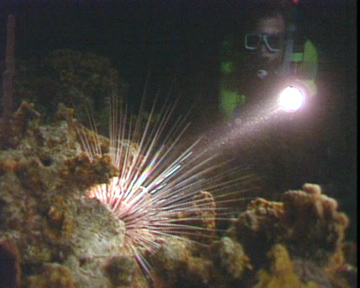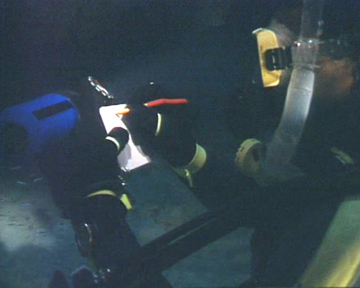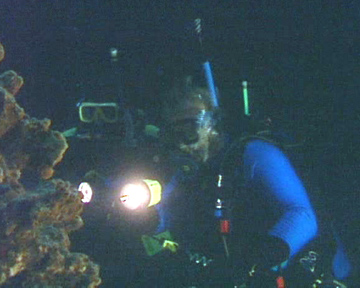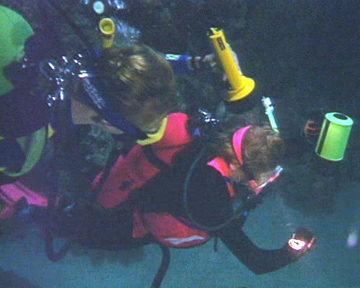
|
|
|
|
|
|
|
 |
|
 |
|
|
|
|
Our site is 256 bit SSL SECURED. SSL (Secure Socket Layer) is the industry standard for viewing and sending sensitive information
on an internet browser. Click on the SSL image below see our site report.
|

|
|
|
 |
|
 |
|
|

|
 |
|
 |
|
|
|
|
As of January 1, 2017, DIVING FOR FUN will
NO LONGER be offering training services. However, we wanted to continue to provide
a list of the classes we offered along with course outlines as a reference for all our past customers.
 Course Overview:
When you go night diving you will see a whole new world. Even your local dive site takes on a
new personality at night, as many underwater creatures and plant life (different from those
you see during the day) are active at night. Course Overview:
When you go night diving you will see a whole new world. Even your local dive site takes on a
new personality at night, as many underwater creatures and plant life (different from those
you see during the day) are active at night.
Prerequisites:
Must be at least 12 years old and certified as a Junior Open Water Diver or an Open Water Diver.
 Course Activities:
You will learn about night dive planning, organization, procedures, techniques and potential problems.
You will also learn how to control your buoyancy, navigate and communicate at night. Since many
of the plants and animals you see at night are different you will also get introduction for nocturnal
aquatic life. You will get to use your new knowledge during the 3 dives you do under the supervision
of an instructor. Course Activities:
You will learn about night dive planning, organization, procedures, techniques and potential problems.
You will also learn how to control your buoyancy, navigate and communicate at night. Since many
of the plants and animals you see at night are different you will also get introduction for nocturnal
aquatic life. You will get to use your new knowledge during the 3 dives you do under the supervision
of an instructor.
- Classroom:
There are one classroom session. The classroom session will cover each of the chapters,
review your knowledge review answers and prepare you for each of the three open water dives.
- Independent Study:
Read the Night Diver Specialty manual
and complete Knowledge Reviews Parts I and II. You will need to turn in the knowledge review
prior to certification or provide a copy of an Adventure Log signed by an appropriate instructor
if you have already done dive one in connection with your Adventure Diver or Advanced Open Water
Diver Certification.
- Open Water Dives:
The 3 open water dives are done at an area lake/scuba park or on a dive trip.
 Forms Required:
Students training will need to complete the three (3) forms: Liability Release, Statement of Understanding, and
Medical Statement prior to entering the water. Forms Required:
Students training will need to complete the three (3) forms: Liability Release, Statement of Understanding, and
Medical Statement prior to entering the water.
Materials/Equipment Required:
Night Diver Specialty Manual. Recommended: Night Diver Specialty DVD.
 Length of Course:
If you have read the Night Diver Specialty Manual, completed the all the knowledge reviews and watched the entire
video prior to coming to class then the classroom will last approximately 1 hour depending upon class size. Length of Course:
If you have read the Night Diver Specialty Manual, completed the all the knowledge reviews and watched the entire
video prior to coming to class then the classroom will last approximately 1 hour depending upon class size.
Related Specialties:
Project AWARE,
Boat Diver,
Coral Reef Conservation,
Deep Diver,
Drift Diver,
Dry Suit Diver,
Enriched Air (Nitrox),
Equipment Specialist,
Fish ID,
Multi-Level Diver,
Night Diver,
Peak Performance Buoyancy,
UW Naturalist,
UW Navigation,
UW Digital Photo,
UW Photo,
UW Search & Recovery,
Wreck Diver.
|
Dive 1:
- Assemble/position surface lighting systems.
- Before descent, take compass bearing on shore/boat.
- Descend down reference line.
- Underwater - adjust to night diving environment.
- Conduct navigation exercise - using a compass and/or natural features, navigate to
a pre-determined location and return to within 25 feet of the starting point, surfacing for orientation only if
necessary.
- Guided underwater tour of area.
Dive 2:
- Assemble/position surface lighting systems.
- Before descent, take compass bearing on shore/boat.
- Descend down reference line.
- Underwater - adjust to night diving environment.
- Underwater guided tour - students are to note nocturnal aquatic life discussed in the academics
portion of the course.
- Conduct navigation exercise - at the end of the dive student to return to the shore or boat underwater
using a compass.
- After surfacing, discussion of underwater tour, nocturnal aquatic life seen and completion
of navigation exercise.
Dive 3:
- Assemble and position lighting systems used for navigation or orientation (surface and underwater
lighting systems).
- Set a compass heading to the shore or boat. Rrecord this heading on a slate.
- Feet first descent using reference line as a visual aid only with a dive light pointed
downward, watch for the bottom and demonstrate anti-silting techniques with a dive light, look for bottom hazards
(aquatic life and sharp objects).
- Underwater - adjust to night diving environment.
- Underwater guided tour - students are to note nocturnal aquatic life discussed in the academics
portion of the course.
- Conduct navigation exercise - at the end of the dive student to return to the shore or boat underwater
using a compass.
- Perform a lights-out exercise for three minutes while remaining in a stationary position on the bottom.
Extinguish lights and adjust to the darkness.
- Conduct you own night dive and return to the boat or shore with at least 500 psi.
- Discussion of lights out exercise.
|
 |
If you need additional information or have questions,
we can be reached at our Contact Us page or visit our
Sign Up page.
|
 |
|
|
|
|
|
 |
|
 |
|

|